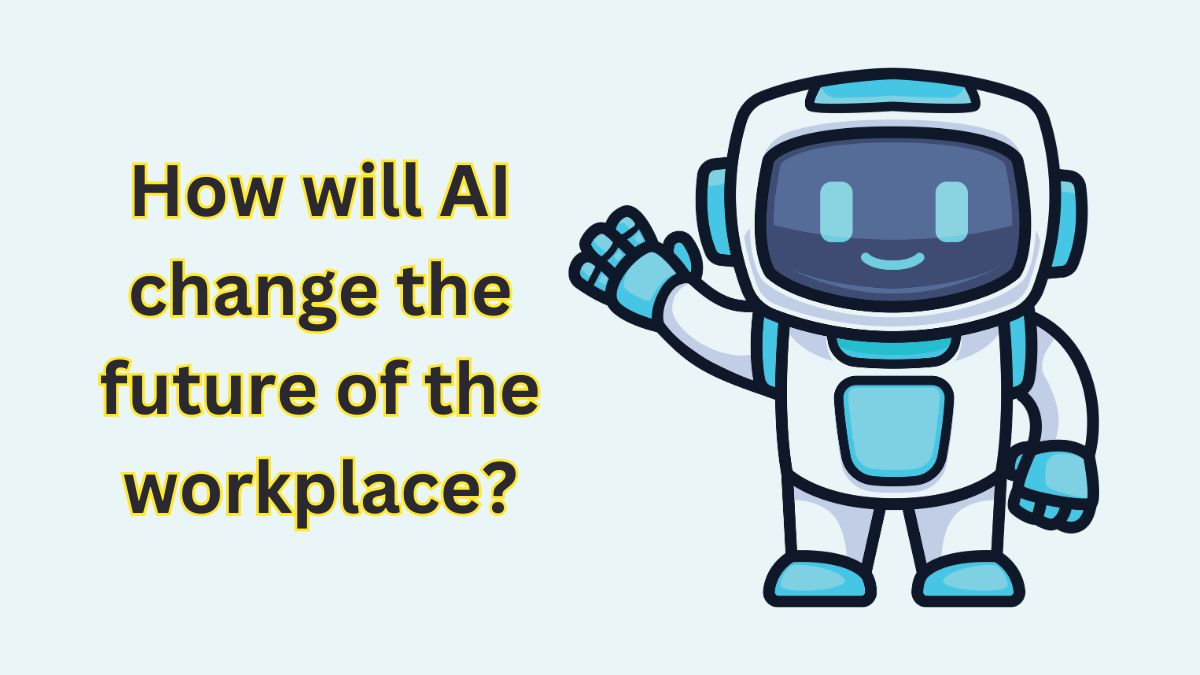How will AI change the future of the workplace: Artificial Intelligence (AI) is rapidly changing the world around us, and the workplace is no exception. From automating routine tasks to enhancing decision-making processes, AI is set to revolutionize how we work. This article explores the various ways AI will shape the future of the workplace, step by step, in simple and easy-to-understand language.
How will AI change the future of the workplace?

1. Automation of Routine Tasks
One of the most significant impacts of AI will be the automation of routine and repetitive tasks. These are tasks that are often time-consuming and monotonous, such as data entry, scheduling meetings, and managing emails. AI-powered tools can handle these tasks more efficiently and with fewer errors.
For example, AI-driven software can scan and process documents, update databases, and even respond to basic customer queries through chatbots. This automation will free up employees’ time, allowing them to focus on more creative and strategic aspects of their jobs.
2. Enhancing Decision-Making
AI can analyze vast amounts of data quickly and accurately, providing insights that humans might miss. This capability is transforming decision-making in the workplace. With AI, businesses can make data-driven decisions, predicting market trends, customer preferences, and even potential risks.
For instance, AI algorithms can analyze customer data to identify buying patterns, helping companies tailor their marketing strategies effectively. In finance, AI can assess investment opportunities by analyzing market data in real-time, aiding in better investment decisions.
3. Personalized Learning and Development
AI is also set to revolutionize employee training and development. Traditional training methods often follow a one-size-fits-all approach, which may not be effective for everyone. AI can personalize learning experiences based on individual needs and learning styles.
Through AI-powered learning platforms, employees can receive customized training programs that focus on their specific areas of improvement. These platforms can adapt in real-time, providing instant feedback and additional resources as needed, making the learning process more efficient and engaging.
4. Improving Recruitment and Talent Management
The recruitment process can be lengthy and complex. AI can streamline this process by automating tasks such as resume screening and candidate shortlisting. AI tools can analyze resumes and match candidates to job descriptions more accurately than human recruiters.
Moreover, AI can help in identifying the best talent by analyzing various factors, including skills, experience, and even cultural fit. This not only speeds up the hiring process but also ensures that companies hire the right candidates for the job.
5. Enhancing Employee Engagement and Well-being
Employee engagement and well-being are critical for productivity. AI can play a significant role in monitoring and improving these aspects. AI-driven tools can analyze employee interactions and feedback to gauge their engagement levels and identify any issues early on.
For example, AI can analyze emails and communication patterns to detect signs of burnout or dissatisfaction. It can then provide recommendations for managers to address these issues, such as suggesting more flexible work hours or additional support for stressed employees.
6. Facilitating Remote Work
The COVID-19 pandemic has accelerated the shift towards remote work, and AI is playing a crucial role in making this transition smoother. AI-powered tools are enhancing remote collaboration by providing smart scheduling, virtual meeting assistants, and real-time translation services.
Moreover, AI can help monitor productivity and ensure that remote workers are staying on track without micromanaging. By analyzing work patterns and performance data, AI can provide insights into how remote teams can work more efficiently.
7. Creating New Job Opportunities
While there are concerns that AI might replace jobs, it is also creating new opportunities. As AI automates routine tasks, new roles that require human creativity, critical thinking, and emotional intelligence are emerging. Jobs in AI development, data analysis, and cybersecurity are in high demand.
Furthermore, AI is driving the need for continuous learning and skill development. Employees will need to upskill and adapt to new technologies, leading to a more dynamic and evolving job market.
8. Ethical Considerations and Challenges
As AI becomes more integrated into the workplace, it is essential to address ethical considerations and challenges. Issues such as data privacy, algorithmic bias, and transparency need to be carefully managed. Companies must ensure that AI systems are used responsibly and that employees’ rights are protected.
Conclusion
AI is undoubtedly transforming the workplace in numerous ways. From automating routine tasks and enhancing decision-making to personalizing learning and improving recruitment, AI offers significant benefits. However, it is also crucial to address the ethical challenges and ensure that AI is used responsibly.
As we move forward, the key to successfully integrating AI into the workplace lies in balancing technology with human skills. By embracing AI while focusing on creativity, critical thinking, and emotional intelligence, we can create a future where technology and humanity work hand in hand, leading to more efficient, innovative, and fulfilling workplaces.
Read More:

Pingback: New AI Works Just Like a Brain - Rank Web Tools